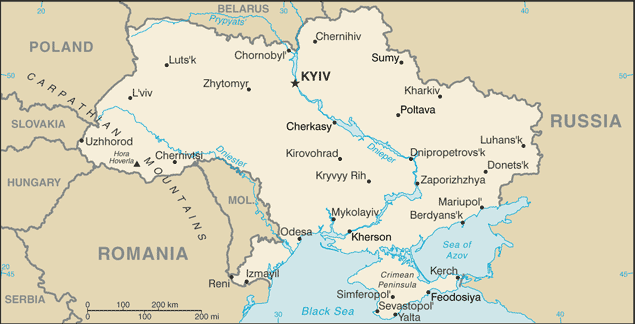by Annemarie Stomp, Research intern with the State of Emergency Project and Prof. Dr. Andrej Zwitter, University of Groningen
Ukraine remains unstable and might be facing a civil war. On the 16th of March, based on a referendum Crimea separated itself (at least de facto) from the Ukraine and the Russian State Duma ratified an agreement that makes Crimea part of the Russian Federation.1 Subsequently, armed groups began seizing government buildings also in the eastern part of Ukraine.2 By the 16th of April, protesters controlled administrative buildings in eight cities of the Donetsk Oblast.3 In response, the Ukrainian president, Oleksandr Turchynov, signed a decree authorising a special mission and the army is put in full combat alert. While one would suspect that Ukraine is under a state of emergency, by nowonly a draft resolution to introduce a state of emergency in parts of the country was introduced in parliament on the 7th of April.4 As a party to the International Covenant on Civil and Political Rights (ICCPR), Ukraine is under the obligation to notify the Secretary-General of declaringa state of emergency. Yet,no notification of derogations under art. 15 has been reported to the United Nations up until now.5
Democratic states are based on principles of the rule of law, checks and balances, and separation of powers. However, during a state of emergency, the effect of these principles is reduced in order to increase the efficacy of the executive. Therefore, constitutional provisions and the ICCPR are important as a safeguard against misuse of the state of emergency. In Ukraine, it is the president who has the authority to declare a state of emergency; the VerkhovnaRada (Ukrainian Parliament) can approve or reject this declaration within a two-day period. While generally viewed with hesitation and suspicion, declaring a state of emergency might be on of the best ways to restore the functionality of the Ukrainian state apparatus by temporarily consolidating the functioning of the executive and by signalling help towards Western states. It would, furthermore, ensure that human rights violations could be kept to a minimum by triggering consultations with the Human Rights Committee and its oversight over both parties in this struggle.
There is generally little empirical research on the circumstances, which lead to state of emergency declarations, the effect of the Human Rights Committee on compliance of ICCPR member states with the covenant, and the Human Rights regulations derogated from. The State of Emergency Mapping project (STEM) was established to address exactly these questions.6 STEM documents any derogation from human rights under the ICCPR during states of emergency in the state parties to the treaty. Furthermore, the STEM website (www.emergencymapping.org) is building a research repository for work on state of emergencies, martial law and related topics.
1. ‘Ukraine angered by Russia PM Medvedev’s visit to Crimea’, BBC News Europe, 31 March 2014, http://www.bbc.com/news/world-europe-26816033.
2. ‘Ukraine: UN rights office urges halt to propaganda, incitement to hatred’, UN News Centre, 15 April 2014, http://www.un.org/apps/news/story.asp?NewsID=47584&Cr=Ukraine&Cr1=#.U05ORvl_tqU.
3.‘Protesters control administrative offices in 8 cities of Donetsk Oblast’, ITAR-TASS News Agency, 16 April 2014, http://en.itar-tass.com/world/728180.
4. ‘Bill on state of emergency in eastern regions of Ukraine goes to parliament’, ITAR-TASS News Agency, 7 April 2014, http://en.itar-tass.com/world/726842.
5. United Nations, Treaty series, Vol. 999, p. 172; United Nations, ‘Depository notifications by the Secretary-General’, Treaty collection, https://treaties.un.org/pages/CNs.aspx.
6.Art.85(31) in conjunction with 106(21) Constitution of Ukraine of 1991, http://www.wipo.int/wipolex/en/text.jsp?file_id=180743.
